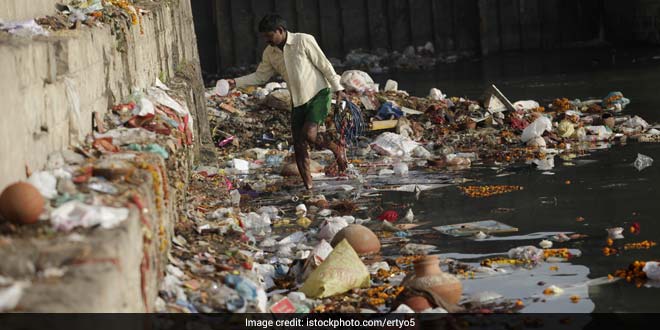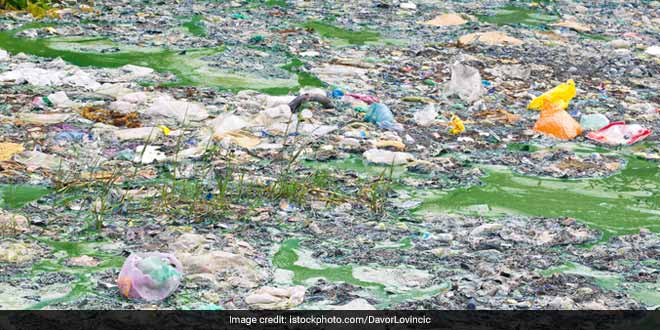New Delhi: In Uttar Pradesh’s Gorakhpur city, Raghani, 42, lives with her husband and two children and together generates few kilograms of waste daily. Every morning, Raghani dispose off the household waste in a vacant area situated outside her house. Today, Raghani and her family are suffering from a skin disease that is mainly caused due to the usage of contaminated water. On the other side of India, Vijay Lakshmi, 38, from Alappuzha city is healthy and happy. She lives with her husband, in-laws and three children. Together the family generates double the amount of waste generated by the family living in Gorakhpur. But, unlike Raghani, Vijay Lakshmi follows a proper waste management system. She segregates the waste into wet and dry waste. Uses wet waste for composting, while sends dry waste for recycling.
This is not just about Raghani and Vijay Lakshmi, according to the many glaring findings of the India State-Level Disease Burden Initiative report published in top medical journal Lancet, people living in Uttar Pradesh are at a higher risk than those in Kerala, of contracting infectious diseases that are caused due to the use of unsafe water, sanitation, lack of handwashing. The report findings also highlighted that on an average a woman in Uttar Pradesh will live twelve years lesser than a woman in Kerala.
Today, Kerala is known as a state that is free from the practice of open defecation and is moving towards the target of becoming 100% waste free state. Kerala has many leading examples when it comes to the effective waste management system, for example, Kannur is a plastic-free city, Alappuzha, a city that manages its own waste without a landfill and Thiruvananthapuram that will become waste-free soon.
On the other side, Uttar Pradesh is still struggling to make its cities open defecation free. It has been four years since the launch of India’s biggest cleanliness drive – the Swachh Bharat Abhiyan and not even single city of Uttar Pradesh has been able to eradicate open defecation, effective waste management system is far behind.
A survey done by the municipal corporation of Gorakhpur in the city highlighted that about 70.5 % population in of the city suffers from the abdominal diseases like Japanese Encephalitis, Jaundice, Cholera, Colitis, Diarrhoea, Worm, Dysentery, and Skin diseases that are mainly the causes of polluted environment and ineffective waste management.
Also Read: India Will Go Down Under Garbage One Day: Supreme Court On Waste Management
On this World Health Day, we take a look at how improper waste management is affecting India’s health:
Manual Scavenging Continues To Exist, Over 300 Deaths In 2017
Despite being made illegal in 1993, the practice of Manual Scavenging still exists in India. According to the data, more than 700,000 manual scavengers still exist in India. In the year 2017, Tamil Nadu reported 140 cases of manual scavenger’s death, while 59 cases have been reported from Karnataka and 52 from Uttar Pradesh. Delhi also reported the death of 12 manual scavengers in 2017.
The reason for the death – deadly diseases due to unhygienic working conditions of Manual Scavengers. Some of the most common health implications, manual scavengers faced are respiratory tract infections, carbon monoxide poisoning, nausea, diarrhoea, and tuberculosis.
Doctors say that infections such as leptospirosis, hepatitis, and helicobacter are rampant among Manual Scavengers. All these health hazards can be prevented if India had a proper waste management system in place.
Beswada Wilson, founder and national convener of Safai Karmachari Andolan says,
It has been four years of India’s biggest cleanliness initiative – the Swachh Bharat Abhiyan. But, the issue of toilet technology or manual scavenging has not been tapped into at all. Swachh Abhiyan has not taken into account India’s 9.6 million dry latrines which flush waste in the open on priority and how it should be cleaned effectively.
Landfills And Health Implications
Giving examples of how two of India’s waste management role model cities succeeded in eradicating diseases by managing just their waste, Swati Singh Sambyal, Programme Manager, Centre for Science and Environment added,
The examples I am talking have succeeded after going through an environmental havoc. Alappuzha in Kerala is today known for managing their waste without a landfill. Today, the city segregates 100 per cent of its waste in 12 of the city’s 23 wards. More than 80 per cent households now have biogas plants and pipe composting system. This was not the situation earlier as there was no garbage collection system in the city. People used to dump their garbage in the six-hectare plot it owned in Sarvodayapuram, a village in the nearby Mararikkulam village panchayat. This had led to environmental crisis, contamination of water sources, stench, and cases of chickengunya, malaria and other diseases were on rise. That’s when Thomas Isaac, who is now the Minister of Finance in Kerala thought of changing the situation. He decided to make one ward waste-free and showed how diseases and health parameters can be improved just by managing the waste effectively.
She further adds,
CSE has been working in Muzaffarnagar in Bihar for past 2 years now. The city is commonly known as ‘Macharpur’ because there are high numbers of Dengue, Malaria and Chickengunya cases. But, from the past two years, the situation has change; a lot less cases of these deadly diseases are being reported because the city is moving towards decentralised waste system.
On the other hand, Puneet Srivastava, Manager Of Policy, WaterAid adds,
In best of the best cities, landfills don’t work properly. Firstly, there is no proper way to collect leachate, (a liquid that passes through landfill and has extracted dissolved and suspended matter from it), as a result it contaminates the ground and water of the surrounding area and leads to various types of diseases. Secondly, most of our cities landfills are dead and way past its limit. Cities should take a cue from successful examples of Alappuzha and Panaji, as both these cities are known for managing their waste effectively without any landfills.
In Pics: 10 Things That You Need To Know About Solid Waste Management Rules 2016
Plastic Waste Crisis
In India, according to government statistics, 15,342 tonnes of plastic waste is generated every day. Out of this, 6,000 tonnes of waste remain uncollected and littered.
As plastic is non-biodegradable, it destroys the whole planet. The harmful chemicals contaminate the health of the ocean creatures and then by entering the food chain poses a danger to human health.
Studies have shown additives used in plastics have different health effects for people. From reproductive abnormalities to wider disruption of our delicate endocrine system, impaired brain and neurological functions, cancer, adult-onset diabetes, early puberty and even obesity, plastic waste can affect human health in various ways.
Also Read: Plastic Waste: How Different Countries Are Handling Plastic And What India Can Learn
Puneet Srivastava concludes by adding,
Currently, the total disease burden on India due to unsafe water, sanitation and waste management is 4.6%, this can come down drastically, if India becomes 100% swachh – which means a country where there are no cases of open defecation, a country that segregates its own waste and a country that knowns how to effectively manage the waste which is created.
Talking about the solutions, he said,
In our country, the problem is not many people are aware about how to treat their own waste. As a result, the waste is mostly disposed off in an ineffective way which results in contamination of the environment and health of people. This situation can only be improved, if each one of us is involved in the waste management activity. Secondly, there are not much on ground data and statistics to report the health implications linked with improper waste management in India. If the country’s population is aware, I am sure these things will be taken care off.




























Devendra
April 8, 2018 at 9:40 am
Waste management is supervised by incharge honestly & plastic carry bag should be bann & supervised by incharge honestly & people is also educate for desess occurred by garbage dump in open garbage dump in proper place
Devendra
April 8, 2018 at 9:42 am
Waste management is supervised by incharge honestly & plastic carry bag should be bann & supervised by incharge honestly & people is also educate for desess occurred by garbage dump in open garbage dump in proper place
Reply